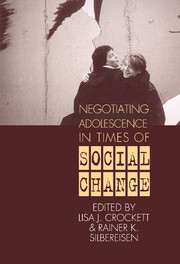Book contents
- Frontmatter
- Contents
- Contributors
- Preface
- 1 Social Change and Adolescent Development: Issues and Challenges
- Part I Models of Social Change Effects
- Part II Social Change and Adolescent Transitions
- Part III Social Change and Adolescents' Social Contexts
- 9 Adolescent Peer Relations in Times of Social Change
- 10 Life Course Dynamics and the Development of New Relations Between Generations
- 11 A Neighborhood-Level Perspective on Social Change and the Social Control of Adolescent Delinquency
- 12 Social Change and the “Social Contract” in Adolescent Development
- Part IV Implications of Social Change for Adolescent Health and Well-Being
- Part V Interventions: Promoting Healthy Development in Times of Social Change
- Endnotes
- Index
12 - Social Change and the “Social Contract” in Adolescent Development
Published online by Cambridge University Press: 26 January 2010
- Frontmatter
- Contents
- Contributors
- Preface
- 1 Social Change and Adolescent Development: Issues and Challenges
- Part I Models of Social Change Effects
- Part II Social Change and Adolescent Transitions
- Part III Social Change and Adolescents' Social Contexts
- 9 Adolescent Peer Relations in Times of Social Change
- 10 Life Course Dynamics and the Development of New Relations Between Generations
- 11 A Neighborhood-Level Perspective on Social Change and the Social Control of Adolescent Delinquency
- 12 Social Change and the “Social Contract” in Adolescent Development
- Part IV Implications of Social Change for Adolescent Health and Well-Being
- Part V Interventions: Promoting Healthy Development in Times of Social Change
- Endnotes
- Index
Summary
In the 20 years since the publication of The Ecology of Human Development (Bronfenbrenner, 1979), social scientists have increasingly become cognizant of the ways that human development is contextualized. The chapters in this section of the volume are no exception. In Bronfenbrenner's framework, they focus on microsystems – families, peer groups, neighborhoods – and illustrate how conditions in, as well as the very definition of, these proximal settings are affected by macrolevel changes.
My commentary is organized in two parts. The first employs the metaphor of a social contract as a conceptual framework for understanding adolescent development in the context of social change. In the second part I take the liberty of rearranging the title of the volume from Negotiating Adolescence in Times of Social Change to Adolescents Negotiating Social Change to highlight the active role of youth as agents of change. As a complement to the three chapters in this section I draw from a program of work I have been directing on adolescents' interpretations of the “social contract.” The first study in this research program compares youth from three stable democratic and capitalist nations (Australia, Sweden, and the United States) with their peers in Bulgaria, the Czech Republic, Hungary, and Russia. The latter nations are in the throes of change from command to market economies and from one-party to multiparty political systems. The second study concerns American adolescents' perceptions of race and ethnic relations in the broader context of their ideas about justice, opportunity, and membership in American society.
- Type
- Chapter
- Information
- Negotiating Adolescence in Times of Social Change , pp. 191 - 198Publisher: Cambridge University PressPrint publication year: 1999
- 2
- Cited by



